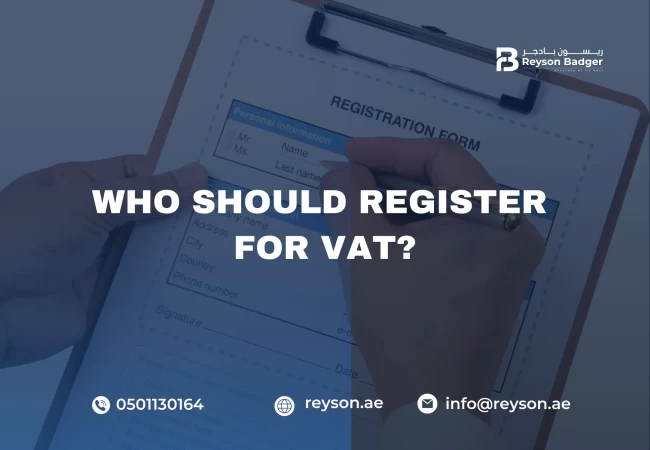Who Should Register for VAT in UAE?

VAT (Value Added Tax) is a consumption tax levied on the value added to goods and services at each stage of the supply chain. In the UAE, VAT was introduced in 2018 at a rate of 5% to diversify government revenue streams and support public spending.
Purpose of VAT in the UAE
- Produce revenue for the government to fund public services and infrastructure development
- Encourage transparency and accountability in business transactions
- Align the UAE with international best practices in taxation
VAT registration is important for businesses operating in the UAE, as it:
- Ensures compliance with tax laws and regulations
- Allows businesses to claim input tax credits and recover VAT costs
- Enhances credibility and reputation
- Facilitates trade and commerce within the GCC region
Businesses with annual taxable supplies exceeding AED 375,000 must register for VAT, while those with supplies below AED 375,000 but above AED 187,500 may voluntarily register.
Who Must Register for VAT in the UAE?
There are two main categories for VAT registration in the UAE: mandatory and voluntary.
Mandatory VAT Registration:
- Businesses are required to register for VAT if the total value of their taxable supplies and imports within the UAE exceeds AED 375,000 per year. This applies to the past 12 months of your business activity or if you anticipate exceeding this limit in the next 30 days.
Taxable supplies include:
- Standard-rated supplies (goods and services subject to the standard VAT rate)
- Zero-rated supplies (goods and services with a 0% VAT rate)
- Reverse charges received (VAT liability shifted to the recipient)
- Imported goods
Non-resident Businesses:
- Regardless of the value of their supplies, any non-resident business making taxable supplies in the UAE must register for VAT. This means that even if your business is based outside the UAE but you sell goods or services subject to VAT within the UAE, you are obligated to register.
Voluntary VAT Registration:
- While not mandatory, some businesses may choose to register for VAT even if their taxable supplies and imports fall below the AED 375,000 threshold. This is referred to as voluntary VAT registration.
Threshold for Voluntary Registration:
- Businesses with taxable supplies and imports exceeding AED 187,500 (but below the mandatory threshold) can opt for voluntary registration.
Benefits of Voluntary Registration:
There are several potential benefits to consider for voluntary VAT registration:
- Claiming Input Tax: Registered businesses can recover VAT paid on their business purchases (input tax) by claiming it against the VAT they charge on their sales (output tax). This can improve cash flow, especially for businesses with a high volume of VAT-inclusive purchases.
- Credibility and Market Perception: Being VAT-registered can enhance your business's image and appear more credible to potential clients, particularly those who are also VAT-registered businesses.
Factors to Consider for Voluntary Registration:
Before opting for voluntary registration, consider these factors:
- Expected Future Growth: Businesses anticipating exceeding the mandatory threshold in the near future might benefit from registering early to avoid any disruptions in their VAT compliance.
- Nature of Business Transactions: Businesses involved in complex transactions with VAT implications, such as those involving imports, exports, or reverse charges, might find voluntary registration simplifies VAT management and record-keeping.
Ultimately, the decision to register for VAT voluntarily depends on your specific business circumstances and future projections. Consulting with a tax advisor can help you determine if voluntary registration is the right choice for your business.
VAT registration exemption
VAT registration exemption refers to the circumstances under which a business or entity is not required to register for Value-Added Tax (VAT). The exemption criteria vary depending on the country or region, but common reasons include:
- Small businesses or startups with annual turnover below a certain threshold (e.g., AED 375,000 in the UAE).
- Entities engaged in non-taxable activities, such as education, healthcare, or charitable work.
- Businesses operating in specific industries, like agriculture or fishing.
- Entities established in free zones or special economic zones with designated tax exemptions.
- Non-profit organizations or government entities.
- Businesses providing exempt goods and services, like basic food items or residential rent.
Conclusion
VAT registration in the UAE can be either mandatory or voluntary, depending on your business activity. If your business makes more than AED 375,000 per year in taxable supplies and imports, or if you expect to soon, you must register for VAT. This rule also applies to all non-resident businesses making taxable supplies in the UAE, no matter the value.
If your business makes between AED 187,500 and AED 375,000 per year, you can choose to register for VAT voluntarily. This can help you claim back some taxes you paid and make your business look more credible. Since VAT rules can be complicated, it’s a good idea to talk to a tax advisor to find out what’s best for your business. At Reyson Badger, we can help you with VAT registration and make sure you follow all the rules. Contact us today for a consultation!

